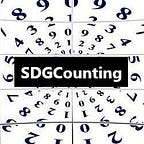COVID-19 and the SDGs — May 19th Update
By Brady Press
Over the past few months, our SDGCounting team has been covering key ways in which the COVID-19 pandemic is affecting progress on the 17 Global Goals. Since our last update article, intensifying global issues have compounded the negative impacts of the virus. In addition, conversations have accelerated over the role the SDGs should play in global recovery.
Additional Obstacles for SDG 3 — Good Health and Well-being
On Friday, UNICEF highlighted the plummeting vaccination rates in the Democratic Republic of Congo — a country which to begin with only had 35% of children under age two fully vaccinated. Vaccination was already declining in the country due to infrastructural challenges, but COVID-19 presents additional barriers: lack of protective equipment for health workers and fears of contracting the virus, which is keeping parents from taking their kids to get vaccinated. Possible rises in preventable diseases like polio, measles, yellow fever, whooping cough and more are jeopardizing the health of thousands of children.
The challenges of COVID-19 is also increasing concerns for mental health globally. A historic lack of resources for those battling mental health issues is even more problematic at a time when many are faced with more trauma, stress and isolation. The UN released a policy brief — COVID-19 and the Need for Action on Mental Health — which illustrates that those who are most vulnerable to the virus and/or its socioeconomic effects are also disproportionately vulnerable to COVID-19-related psychological distress, including healthcare workers, seniors, people with pre-existing health conditions, women, children and people in fragile humanitarian and conflict environments such as migrants and refugees.
Migrants and Refugees Face Disproportionate Challenges
Outside of mental health challenges, refugees’ physical health (SDG 3) is extremely vulnerable as the virus’ spread is likely in the tight and often unsanitary conditions they live under. Realizing a fear of humanitarian workers, Rohingya refugees in one of the world’s largest refugee camps, Cox’s Bazar in Bangladesh, have begun to contract COVID-19.
Migrants and refugees have also fallen victim to criminal groups that are using the pandemic to exploit the vulnerable and gain more control over local communities, dialing back progress on SDG 16. In Central America, according to UNHCR spokesperson Andrej Mahecic, extortion, drug trafficking and sexual and gender-based violence is on the rise and lock downs are making it more difficult for victims to seek assistance. Many migrants and refugees work in the informal economy, which has been heavily disrupted by COVID-19 restrictions. This is causing further exploitation as more people are turning to sex work as their best option for income.
In Central Asia, migrants are also struggling with income loss due to COVID-19 restrictions, with 60% reporting inability to pay rent and 40% unable to afford food. More than 80% of migrants in this region — Kazakhstan, Kyrgyzstan, the Russian Federation, Tajikistan, Turkmenistan and Uzbekistan — noted a reduction or total loss in their income. In response, the International Organization for Migration (IOM) launched a $7 million appeal to offer health care, education and other necessary resources to the region’s most vulnerable.
Plans for Recovery
Despite pervasive challenges to the SDGs, government leaders are recognizing the importance of the Goals as a framework to ensure vulnerable groups are at the forefront of all aspects of COVID-19 recovery. The Prime Minister of Norway and the President of the Republic of Ghana noted that “the response to the pandemic cannot be de-linked from the SDGs.” According to them:
“Achieving the SDGs will put us on a firm path to dealing with global health risks and emerging infectious diseases. Achieving SDG 3 will mean strengthening the capacity of countries for early warning, risk reduction and management of national and global health risks.
While some SDG gains have been eroded, this should not deflate our energy. They should rather spur us to accelerate and deepen our efforts during this Decade of Action to ‘recover better’, and build a healthier, safer, fairer and a more prosperous world.”
Likewise, city leaders believe that inclusive policies and diverse representation in decision making are crucial to ensuring a sustainable society as we build back from the pandemic. Brookings Institute speaks more on this topic, and wrote an article compiling messages from officials shortly before the COVID-19 outbreak that shows benefits of aligning o the Global Agenda. While priorities have changed, the principles offered by the SDGs are more important than ever: leave no one behind, embrace interdependence, set goals and form partnerships.
Brady Press is an Associate Director at Changing Our World, where she specializes in building strategic corporate citizenship programs. She is a consultant to SDGCounting and StartingUpGood, and is currently researching how COVID-19 is affecting the Sustainable Development Goals.
